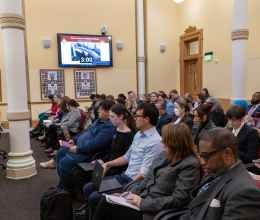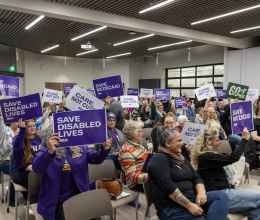
June 2020 marks the first anniversary of the beginning of the Hong Kong protest. In the past year, students in Hong Kong joined hands with suited professionals, stay-home moms, and seniors to resist against the city’s fading freedom under the iron fist of an authoritarian regime. While being physically away from home and enduring the pain of not being with my people, my heart has never left Hong Kong.
Studying in the U.S. and now interning at the ACLU of Colorado have been precious opportunities for me to reflect on what activism means. In particular, my time in the U.S. has shown me the enormous power of the civil society holding authorities accountable and bringing about change.
American society has come together and called for meaningful reform by protesting on the streets and demanding legislators take action after the horrendous murder of George Floyd, Breonna Taylor, and many more Black people. Black protesters stand side by side with white allies, LGBTQ+ advocates, labor activists and feminists. The pain of police brutality and systemic racism hits our Black community the hardest, but we all rise to shoulder the pain. No doubt, Hong Kong and the U.S. are fighting different battles and their people are enduring different pain, but the fight here reminds me of the fight back home every minute.
My biggest surprise comes not from the strong resistance of the people, instead, it comes from how corporations and celebrities have reacted. Growing up in Hong Kong, I have gotten used to influential groups and individuals staying silent in moments of crisis due to pressure by the government.
Apple Daily, a pro-democracy news outlet, had its ad revenue decreased because China ensured advertising agencies would not post ads on its platform. Celebrities that voice their support for democracy movements are blacklisted from China and have their contracts terminated by businesses that fear repercussions. Cathay Pacific, Hong Kong’s largest airline, fired employees who criticized the police and the government on social media, as Beijing threatens to close off the airline’s Chinese airspace unless it contains its employees. Leung Chun-ying, Hong Kong’s former Chief Executive, called for a boycott of HSBC because it had not publicly backed Beijing’s push to enact a new national security law in Hong Kong. One week later, the bank published a statement supporting the law.
Imagine how shocked I was seeing celebrities and big corporations in the U.S. voicing support towards the Black Lives Matter protest. While many of my American friends considered these statements as empty promises and purely for publicity (which I totally agree), I contrasted it with the silence I see in Hong Kong.
It was extremely frustrating to see the very same corporations and celebrities that supported BLM denounce the Hong Kong protest and support Beijing’s newly-imposed national security law. Hong Kong protesters pointed this out as hypocrisy that celebrities and big corporations are more guided by profit instead of their moral compass.
However, I see this “hypocrisy” or contradicting attitude hinting at a bigger issue: the price for free speech.
In the U.S., it can be reasonably assumed that over half of the population supports BLM. From a profit-making perspective, it makes absolute sense that celebrities and corporations would voice support to the movement in order to build a socially-progressive corporate/personal image.
Similarly, over half of the Hong Kong population supports the protest as seen in the election last November. Yet, instead of supporting the protest, celebrities and big corporations frequently criticize the protest. I attribute this to one root cause - government pressure.
This can come in different forms: blacklisting and forbidding corporations and celebrities from entering the mainland Chinese market, threatening business partners to cut connections, starting influence campaigns to call for boycotts, etc.
The influence campaign, in particular, comes in more subtle forms but often incur huge damage to the attacked corporations and celebrities. A Hong Kong singer that reminded his fans to register as voters was accused of supporting Hong Kong independence by mainland Chinese netizens and was subsequently delisted from a music festival in China.
China is never hesitant to make corporations and celebrities pay their price for free speech.
Free speech is the cornerstone of a healthy civil society. As China gradually tightens its hold of Hong Kong’s free speech, Hong Kongers have never ceased to resist by subscribing to news outlets whose ad revenues suffered from a huge hit due to government suppression and supporting celebrities that have been blacklisted by China. The fight is not hopeful by any means, but it will and must continue.
We must all remember: free speech should never be suppressed.
— Kelly Yue, Summer Fellow


